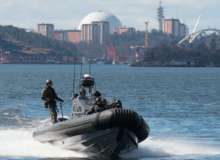National Task Force
| National Task Force | |
|---|---|
| Active | 1991 - Present |
| Country |
|
| Allegiance | Swedish Police Authority |
| Branch | National Operations Detachment |
| Type | Counter-terrorism unit |
| Role | Domestic Counter-Terrorism and Law Enforcement |
| Size | Unknown |
| Motto | "Posse Ante Factum Audere Cum Convenit" |
| Engagements |
Various hostage operations Capture of Mijailo Mijailović and several suspect terrorists |
| Commanders | |
| Current commander | Marie Jarnérus |
The National Task Force (Swedish: Nationella insatsstyrkan, NI), formerly known as the National Task Force of the Swedish Civilian Police (Swedish: Ordningspolisens nationella insatsstyrka), is a special operations unit within the National Operations Department of the Swedish Police Authority. It is meant to handle extraordinarily difficult or life-threatening criminal situations, such as terrorism, hostage situations, armed kidnapping and serving high risk arrest warrants in cities too remote for the Piketen in Stockholm, Gothenburg and Malmö to handle. It also deals with emergency rescue situations that would be too dangerous or difficult for other police units or emergency services. NI's missions are identical to those of Germany's GSG 9, French GIGN, British SCO19, Irish ERU and the FBI HRT in the United States.[1] In 2006, NI officers were deployed to Lebanon to help evacuate Swedish citizens during the war between Hezbollah and Israel. NI officers have also been deployed with Special Team Six in Kosovo.
Organization

NI has one head of the unit (currently Marie Jarnérus) with a number of subordinated coordinators, and a staff of older, distinguished police officers. Under this management group the force is divided into 8 groups:
- Alpha
- Bravo
- Charlie
 Members of the National Task Force participating in a boarding exercise in cooperation with the Swedish Coast Guard.
Members of the National Task Force participating in a boarding exercise in cooperation with the Swedish Coast Guard. - Delta
- Echo
- Fox (snipers)
- Golf (snipers)
- Hotel (divers)
Selection
To be eligible for NI, the applicant is required to have at least 2 years of distinguished service in the police, a clean criminal record, and be able to pass a series of tests:
- Physical stamina
- Marksmanship
- Non-predisposition for several types of phobias, such as fear of cramped spaces, heights or water
- Psychological fitness
- Deep interview
- 10 days in the field
Service
Members of the NI work full-time in the force. They used to work two weeks and then have two weeks of regular police work, but as the need for them increased they changed it to full-time to cope with the demand and the need for more training. Part of their training is done with the Swedish armed forces. Several of the members are former members of elite military units, and the Nationella Insatsstyrkan is described by some as a paramilitary unit within the Swedish police force.
NI often train with the special forces unit of the Armed Forces, the Special Operations Task Group.
Armament

NI has access to a wide variety of weapons including submachine guns (MP5), assault rifles (G36) and shotguns. In addition, all operators use the SIG Sauer P226 pistol as sidearm, which is the standard sidearm used by all Swedish police officers. Snipers are equipped with the L96A1 AW sniper rifle (Swedish military designation: PSG90), and according to pictures taken during US President Barack Obama's visit to Stockholm in September 2013, the new Sako TRG M10 Sniper Weapon System in caliber .338 Lapua Magnum. The special equipment of Nationella Insatsstyrkan is significantly different from that of the ordinary police. Their equipment, such as communication radios suitable for diving and special ceramic bullet resistant vests, is specific to the situations they would be called upon for. They also distinguish themselves from other Swedish police by a wide variety of uniforms, including woodland camouflage.
Similar units
-
 Germany – GSG 9
Germany – GSG 9 -
 France – RAID
France – RAID -
 United States – FBI Hostage Rescue Team
United States – FBI Hostage Rescue Team -
 Denmark – AKS
Denmark – AKS -
 Norway – Emergency Response Unit
Norway – Emergency Response Unit -
 United Kingdom – SCO19
United Kingdom – SCO19
See also
References
- ↑ "Major European anti-terrorism exercise". 17 April 2013. European Commission. Retrieved 4 May 2014.
| Wikimedia Commons has media related to National Task Force. |